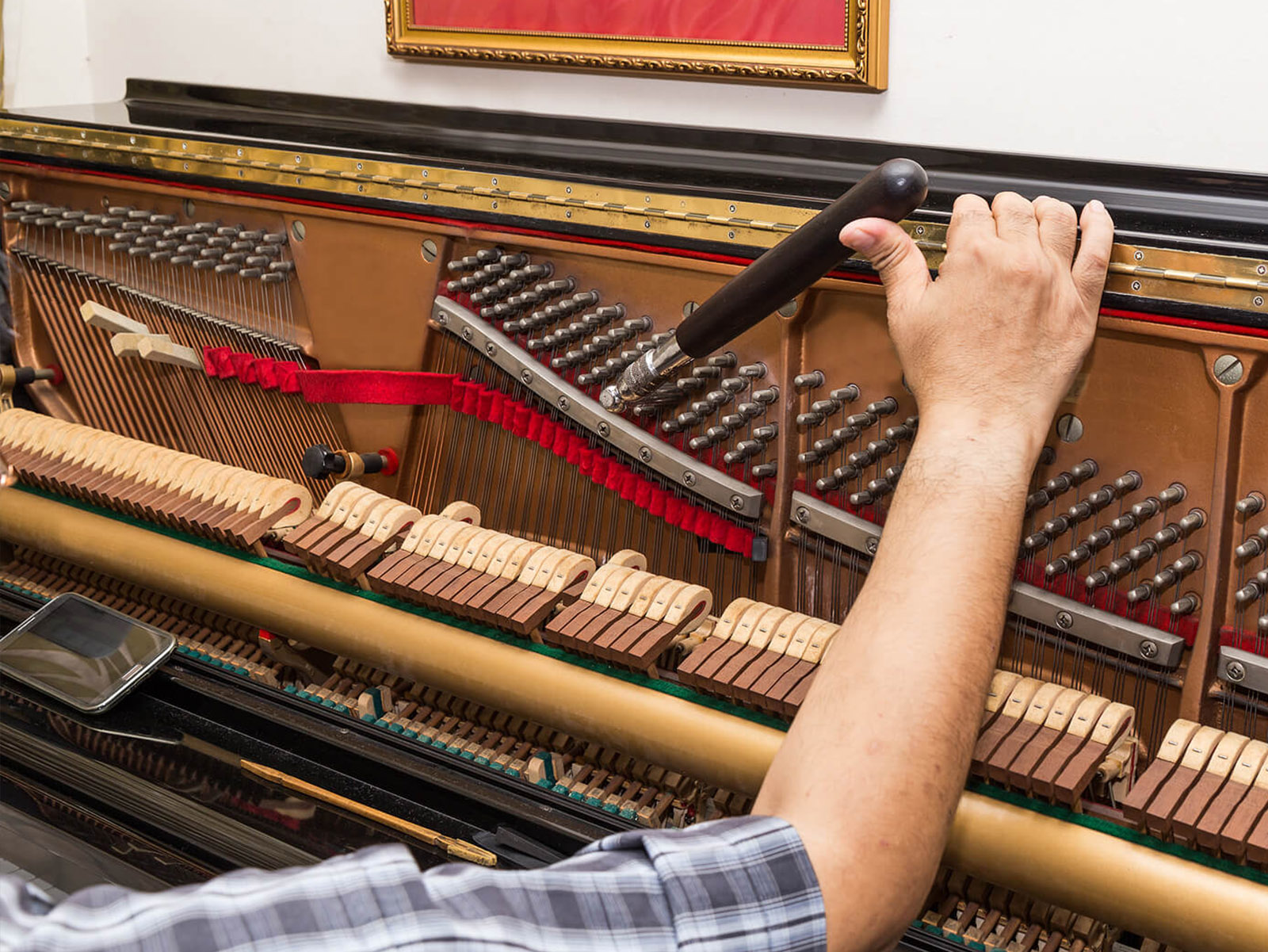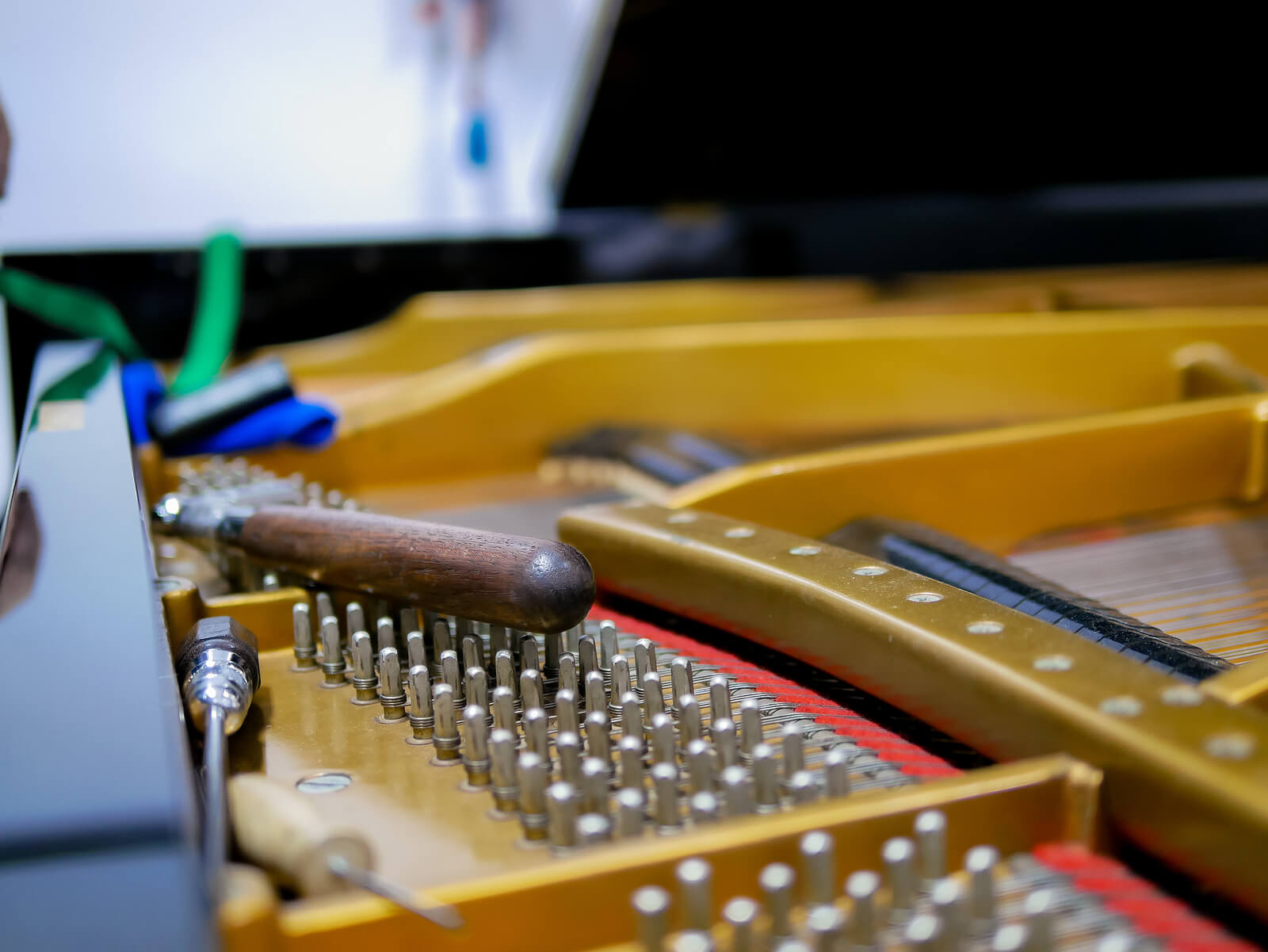TUNING
Off-Key?
call me!
TUNING
Your piano is an investment in your future. It can bring you and your family a lifetime of music, adding immeasurable joy and beauty to your home. Because it also is such a large investment, it should be maintained with the utmost care. Regular servicing by a qualified tuner-technician will preserve your instrument and help you avoid costly repair in the future. Here’s what some of the major piano manufacturers recommend.
Baldwin Piano Company
Because it takes some time for any new piano to become thoroughly settled and adjusted to the atmospheric conditions in its home, proper tuning and servicing are especially important for the first year after purchase. Any new piano should be tuned several times during this first year. During these tunings, your technician should check the action and regulate to compensate for adjustment of new action parts to climate and use. After the first year a piano should be tuned at least twice each year. If the environment has not been kept as uniform as possible, a piano may need frequent tuning.
Kawai Piano Company
Quality pianos demand quality care. Pianos require periodic maintenance in three areas: tuning, action regulation and voicing. Tuning is addressed more frequently than the other service areas depending on circumstance and atmospheric variance. Due to stretching, settling and the effects of climate, one should allow at least three tunings in the first year and a minimum of twice per year thereafter.
Kimball Piano Company
The regularity of service is as important as the frequency in keeping the piano in top condition. We recommend four tunings a year, at regular intervals, for optimal stability and performance. Regulation is also required periodically to maintain the proper function of keys, action, and pedals. A qualified piano technician or reputable dealer can provide advice concerning regulation, as well as perform tuning or other services required for the proper care of the instrument.
Alfred Knight, Ltd.
It is recommended that new Knight pianos should be tuned four times during the first year, and thereafter on a minimum of three occasions annually. This is due to changes in humidity and temperature and, of course, to the amount of use the piano receives. Furthermore, it is essential that the technician be fully qualified and competent as a poorly skilled one can do more harm than good. Of great assistance to tuning stability is the installation of the Dampp-Chaser humidity control system, manufactured by Dampp-Chaser, Inc., of Hendersonville, North Carolina
Sohmer & Company
A new piano, in particular, should be tuned at least four times during the first year in service. The tuning should be performed subsequent to a change of season. After the piano has settled in, we recommend three tunings a year, whether the piano is used a great deal oar not. A technician cannot get a neglected piano to hold tune with one tuning; sometimes, it is more costly to restore the neglected piano to hold tune than if it had been kept under regular and constant care. A piano is a major investment; it should be protected.
Steinway & Sons
Your Steinway piano was tuned many times before it left our factory. It was tuned to and should be maintained at A440 pitch. This is the internationally accepted standard and the standard for which all Steinway pianos are engineered. Unfortunately, no matter how expertly a piano is tuned, atmospheric variations and the nature of the piano’s construction constantly conspire to bring it off pitch. Your Steinway has been designed and built so that in normal use and under normal conditions it should need only periodic tuning. We recommend that your technician be called at least three or four times a year. You, however, are the final judge and should have the piano tuned as often as you think necessary. To put the matter of tuning into perspective, remember that a concert piano is tuned before every performance, and a piano in a professional recording studio, where it is in constant use, is tuned three or four times each week as a matter of course. Tuning is an art practiced by skilled professionals and under no circumstances should anyone other than a professional be allowed to tune your Steinway piano.
Wurlitzer Company
In the first year, Piano Manufacturers Association International recommends that you have your piano tuned four times. This is a period of adjustment for a new instrument and proper attention is important. After the first year, you should have it tuned at least twice a year depending upon the frequency of use and atmospheric conditions.
Yamaha Pianos
New pianos should be tuned a minimum of four times the first year to compensate for the normal settling that takes place. Subsequently, as a matter of standard maintenance, a piano should be tuned at least twice a year. Of course, some musicians will choose to have their own piano tuned more often to satisfy their own personal musical requirements. When your piano needs tuning, ask your authorized Yamaha piano dealer or call a skilled qualified specialist such as a Piano Technicians Guild Registered Piano Technician (RPT).
Young Chang America, Inc.
Piano owners will receive the longest life and optimum performance from a new piano if it is properly serviced during the first year and regularly care for subsequently. It is our recommendation that a piano receive at least 4 tunings during the first year of ownership, and a minimum of 2 tunings per year thereafter. We suggest that the piano owner follow the recommendation of his/her local piano technicians, who is most qualified to advise the owner about the needs of the piano in its specific location. Your piano, like those in homes and on stages throughout the world, is an instrument of extraordinary promise which can bring you and your family a lifetime of enjoyment. To ensure its performance over that lifetime, it is important to have your piano serviced regularly by a qualified professional. Complete piano service should include periodic regulation and voicing in addition to tuning. Your technician can consult with you to recommend a maintenance schedule customized for your instrument.


